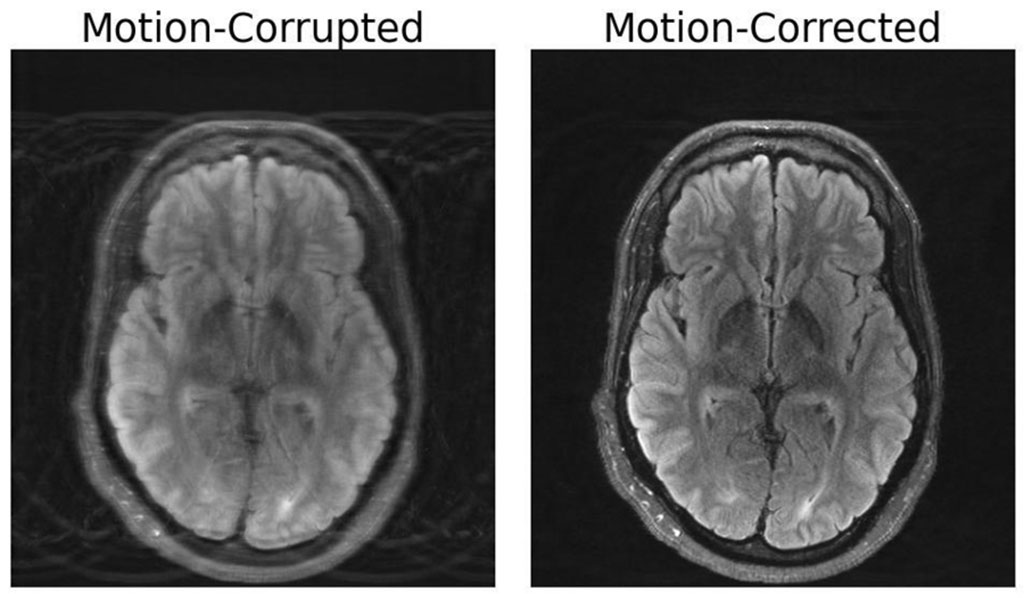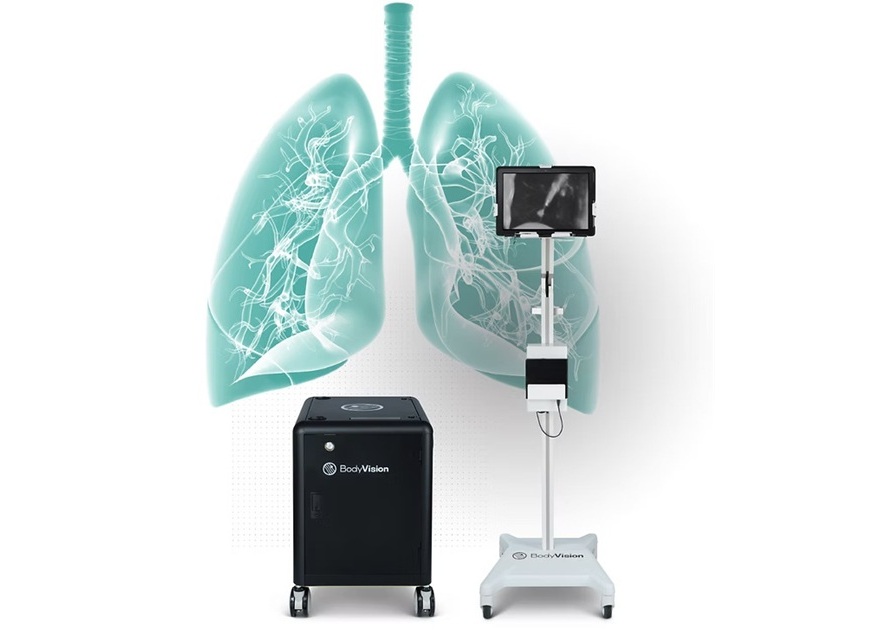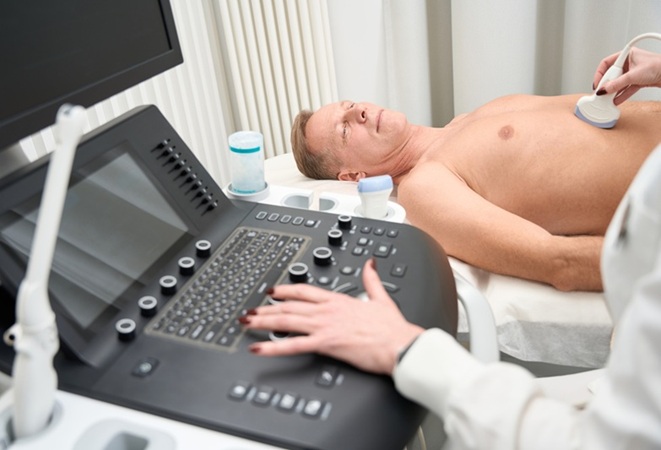New Approach Combines Deep Learning and Physics to Fix Motion-Corrupted MRI Scans
|
By MedImaging International staff writers Posted on 18 Aug 2023 |

MRI (Magnetic Resonance Imaging) is known for its superior ability to provide high-quality soft tissue contrast, making it a preferred choice over other imaging techniques like X-rays or CT scans. However, one of the challenges with MRI is its extreme sensitivity to even the smallest movements, leading to image artifacts. Such artifacts can obscure essential details, putting patients at risk of being misdiagnosed or receiving incorrect treatment. The process of an MRI scan varies in duration, ranging from a matter of minutes to an entire hour, depending on the specific images required. Even during the quickest scans, minor movements can greatly distort the resulting image. While in typical camera imaging, motion results in a localized blur, motion during an MRI scan can cause artifacts that corrupt the entire image. Some patients may be anesthetized or asked to control their breathing to minimize movement, but these solutions are not always feasible, especially in specific populations such as children or patients with psychiatric disorders.
Researchers at MIT (Cambridge, MA, USA) have risen to this challenge by creating a novel deep-learning model that can correct motion in brain MRI scans. This method combines physics-based modeling with deep learning techniques, enabling the construction of a motion-free image from corrupted data, without the need to alter the actual scanning process. The brilliance of this combined approach is its ability to ensure consistency between the image produced and the actual physical measurements of what is being depicted. If this balance is not maintained, the model could create "hallucinations"—images that look realistic but are physically and spatially incorrect. This could lead to even more misleading diagnoses. The application of an MRI free from motion artifacts would not only enhance patient outcomes but also has broad-reaching implications, especially for patients with neurological disorders causing involuntary movements, such as Alzheimer's or Parkinson's disease.
The impact of motion artifacts is not merely confined to patient diagnosis. An earlier study estimated that motion-related issues affect 15% of brain MRIs, leading to repeated scans or extended imaging sessions. This necessity for re-imaging translates into increased hospital costs per scanner. The researchers believe that their innovation could be further expanded. Future investigations might delve into more complex types of head movement or explore motion-related challenges in other parts of the body. For example, fetal MRI, which faces the problem of rapid and unpredictable motion, requires an approach that goes beyond simple translations and rotations. The development of a motion correction method for brain MRI scans marks a significant advancement in medical imaging that can improve diagnostic accuracy as well as reduce healthcare costs.
Related Links:
MIT
Latest MRI News
- Ultra-Powerful MRI Scans Enable Life-Changing Surgery in Treatment-Resistant Epileptic Patients
- AI-Powered MRI Technology Improves Parkinson’s Diagnoses
- Biparametric MRI Combined with AI Enhances Detection of Clinically Significant Prostate Cancer
- First-Of-Its-Kind AI-Driven Brain Imaging Platform to Better Guide Stroke Treatment Options
- New Model Improves Comparison of MRIs Taken at Different Institutions
- Groundbreaking New Scanner Sees 'Previously Undetectable' Cancer Spread
- First-Of-Its-Kind Tool Analyzes MRI Scans to Measure Brain Aging
- AI-Enhanced MRI Images Make Cancerous Breast Tissue Glow
- AI Model Automatically Segments MRI Images
- New Research Supports Routine Brain MRI Screening in Asymptomatic Late-Stage Breast Cancer Patients
- Revolutionary Portable Device Performs Rapid MRI-Based Stroke Imaging at Patient's Bedside
- AI Predicts After-Effects of Brain Tumor Surgery from MRI Scans
- MRI-First Strategy for Prostate Cancer Detection Proven Safe
- First-Of-Its-Kind 10' x 48' Mobile MRI Scanner Transforms User and Patient Experience
- New Model Makes MRI More Accurate and Reliable
- New Scan Method Shows Effects of Treatment on Lung Function in Real Time
Channels
Radiography
view channel
AI-Powered Imaging Technique Shows Promise in Evaluating Patients for PCI
Percutaneous coronary intervention (PCI), also known as coronary angioplasty, is a minimally invasive procedure where small metal tubes called stents are inserted into partially blocked coronary arteries... Read more
Higher Chest X-Ray Usage Catches Lung Cancer Earlier and Improves Survival
Lung cancer continues to be the leading cause of cancer-related deaths worldwide. While advanced technologies like CT scanners play a crucial role in detecting lung cancer, more accessible and affordable... Read moreUltrasound
view channel
Tiny Magnetic Robot Takes 3D Scans from Deep Within Body
Colorectal cancer ranks as one of the leading causes of cancer-related mortality worldwide. However, when detected early, it is highly treatable. Now, a new minimally invasive technique could significantly... Read more
High Resolution Ultrasound Speeds Up Prostate Cancer Diagnosis
Each year, approximately one million prostate cancer biopsies are conducted across Europe, with similar numbers in the USA and around 100,000 in Canada. Most of these biopsies are performed using MRI images... Read more
World's First Wireless, Handheld, Whole-Body Ultrasound with Single PZT Transducer Makes Imaging More Accessible
Ultrasound devices play a vital role in the medical field, routinely used to examine the body's internal tissues and structures. While advancements have steadily improved ultrasound image quality and processing... Read moreNuclear Medicine
view channel
Novel PET Imaging Approach Offers Never-Before-Seen View of Neuroinflammation
COX-2, an enzyme that plays a key role in brain inflammation, can be significantly upregulated by inflammatory stimuli and neuroexcitation. Researchers suggest that COX-2 density in the brain could serve... Read more
Novel Radiotracer Identifies Biomarker for Triple-Negative Breast Cancer
Triple-negative breast cancer (TNBC), which represents 15-20% of all breast cancer cases, is one of the most aggressive subtypes, with a five-year survival rate of about 40%. Due to its significant heterogeneity... Read moreGeneral/Advanced Imaging
view channel
AI-Powered Imaging System Improves Lung Cancer Diagnosis
Given the need to detect lung cancer at earlier stages, there is an increasing need for a definitive diagnostic pathway for patients with suspicious pulmonary nodules. However, obtaining tissue samples... Read more
AI Model Significantly Enhances Low-Dose CT Capabilities
Lung cancer remains one of the most challenging diseases, making early diagnosis vital for effective treatment. Fortunately, advancements in artificial intelligence (AI) are revolutionizing lung cancer... Read moreImaging IT
view channel
New Google Cloud Medical Imaging Suite Makes Imaging Healthcare Data More Accessible
Medical imaging is a critical tool used to diagnose patients, and there are billions of medical images scanned globally each year. Imaging data accounts for about 90% of all healthcare data1 and, until... Read more
Global AI in Medical Diagnostics Market to Be Driven by Demand for Image Recognition in Radiology
The global artificial intelligence (AI) in medical diagnostics market is expanding with early disease detection being one of its key applications and image recognition becoming a compelling consumer proposition... Read moreIndustry News
view channel
GE HealthCare and NVIDIA Collaboration to Reimagine Diagnostic Imaging
GE HealthCare (Chicago, IL, USA) has entered into a collaboration with NVIDIA (Santa Clara, CA, USA), expanding the existing relationship between the two companies to focus on pioneering innovation in... Read more
Patient-Specific 3D-Printed Phantoms Transform CT Imaging
New research has highlighted how anatomically precise, patient-specific 3D-printed phantoms are proving to be scalable, cost-effective, and efficient tools in the development of new CT scan algorithms... Read more
Siemens and Sectra Collaborate on Enhancing Radiology Workflows
Siemens Healthineers (Forchheim, Germany) and Sectra (Linköping, Sweden) have entered into a collaboration aimed at enhancing radiologists' diagnostic capabilities and, in turn, improving patient care... Read more



















